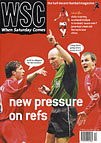 October's friendly between France and Algeria ended up providing the opposite of the symbolism its organisers had hoped for, writes Alan Duncan
October's friendly between France and Algeria ended up providing the opposite of the symbolism its organisers had hoped for, writes Alan Duncan
October 6 was supposed to herald a new era in the complex world of Franco-Algerian relations with the first ever football friendly between the two nations. Yet it may now be better remembered as the day France was confronted with a deeper social unease that will not simply disappear with the blow of a whistle.
The world champions were leading 4-1 with 14 minutes left when a crowd invasion by what were described in the press as “largely Algerian and black youths” brought the match to a premature and unsavoury end. Although the fans were quickly removed from the pitch they threw bottles and seats back down towards the turf, forcing the match to be abandoned.
This was not, by any definition, in the elaborate script of reconciliation that had already seen the two sides presented as “Messengers of Peace” to a capacity crowd in the Stade de France. Nor would it help to form, as some had hoped, a tentative diplomatic bridge stretching across the Mediterranean in a new age of French openness towards its former colony.
The first signs that the mood in the stadium was out of tune with the prevailing political and sporting utterances came when the Marseillaise was booed.A livid Lilian Thuram, who later had to be pulled away from an angry exchange with a young pitch invader, expressed the mood on the field: “I was not expecting that at all,” said Thuram. “The Algerian anthem was not booed, there was respect for Algeria, so why did these young people, most of whom were born in France, boo their country’s anthem?”
The answer came by way of an article written by the Algerian ambassador to France, Mohamed Ghoualmi, in Le Monde: “They whistled… because of what they encounter when they are looking for a job, a roof to put over their heads, or when they are refused entry to a nightclub,” the diplomat wrote. “They whistled for the ‘go back to your country’ that many of them have heard at least once in their young lives.”
Earlier this year France was shaken by the confessions of a retired general on the widespread use of torture and summary executions during the bloody eight-year war that ultimately led to Algeria’s independence in 1962. The scars from the war are still livid. But, as Manchester United’s Mickael Silvestre observed, purported acts of protest such as the Stade de France incident may serve only to reinforce stereotypes and social prejudice. “I deeply regret what happened,” he said. “These populations are already under criticism, and now it will be easier for the National Front to spread their theories.”
The regret was felt even more strongly in a subdued Algerian dressing room. National coach Rabah Madjer said: “I feel very saddened. My players look down-trodden, shocked. These people were clearly bent on disrupting the match.”
The arrest of four Algerians in Paris on the eve of the match and a bomb alert prior to kick-off suggested as much. But ambassador Ghoualmi believes the disruption was not simply directed at France. “They were also sending out a powerful message to Algeria, rejecting the pejorative label of ‘immigrant’ that is so often stuck on them when they come back and visit,” he said.
These are French citizens who feel cut off both from the nation they live in and divorced from their parents’ homeland. The France they came to applaud was that of just one person, Zinedine Zidane, who received a rousing reception. Without his presence the match would never have even been conceivable. Born in France of parents from the Kabylie region of Algeria, Zidane’s journey from the bleak surroundings of the northern Marseille suburbs to become one of the most coveted players in world football has made him an icon for Algerians and other Africans living in France.
Madjer and many high-ranking Algerians have called for France’s good faith to be extended to a “return leg” after next year’s World Cup. Sadly, the Stade de France debacle and the September 11 terrorist attacks on the US are likely to consign football to the long list of unresolved issues in Franco-Algerian relations.
The statisticians recorded goals by Vincent Candela, Emmanuel Petit,Thierry Henry and Robert Pires for France, and a wonderfully struck free-kick by the Marseille player Djamel Belmadi for Algeria. For the French the focus has remained firmly on extracting some positive symbolism from the 76 minutes of play. However, for those who feel that the acts of the pitch invaders, however juvenile or scandalous, deserve to be explored more deeply as a route to genuine reconciliation, this merely confirms a long tradition of France’s selective amnesia when dealing with “the other half” which is Algeria.
From WSC 178 December 2001. What was happening this month